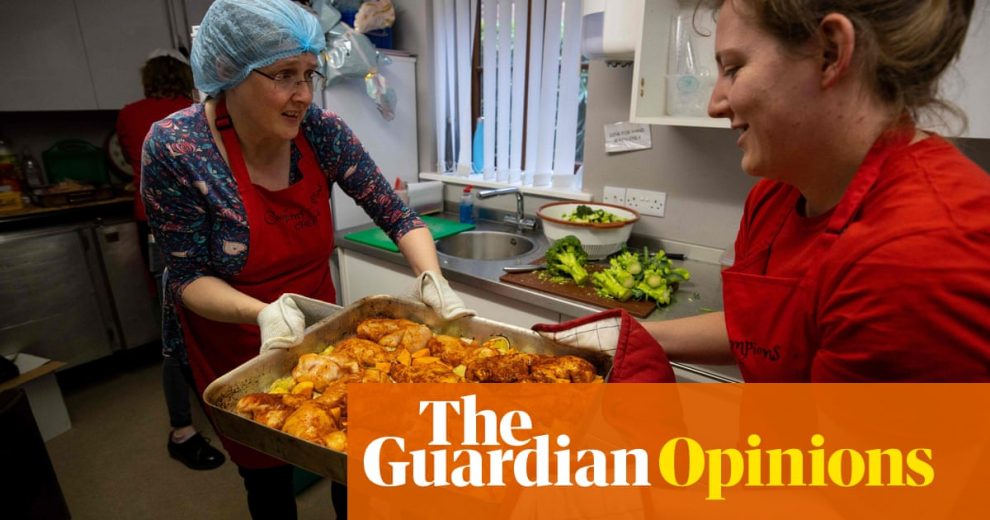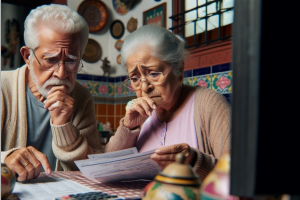As England goes into a new national lockdown this week, there are signs that the tide of public opinion is turning away away from caricatures of those on welfare as “shirkers” enjoying a life of ease on state funds.
Certainly, coronavirus has exposed the fragility of our social security system, which has been so weakened by the cuts and reforms of the past 10 years. But it has also exposed the fallacy of the idea of benefits as a lifestyle choice.
This week, new research showed growing numbers of “newly hungry” people: middle-income households who, during the pandemic, were left with no choice but to use food banks, often for the first time.
But the rushed policy response to this second national lockdown has also exposed divisions being drawn between hardworking families and “welfare dependants”. While the government immediately announced an extension to the furlough scheme – supporting those still in work, it has refused to commit to making the £20 a week uplift to universal credit permanent.
In the absence of an adequate government child poverty-focused response from the government, many will be looking to the footballer-turned-campaigner Marcus Rashford for help in trying to ensure that families don’t go hungry this Christmas.
Rashford has garnered support for his free school meals and campaign in some unlikely places. Even so, it was surprising, if not more than a little galling, when former chancellor, George Osborne, called on the government last week to “realise it’s game over” and extend free school meal replacements into the holidays.
Recasting himself as a commentator, Osborne seems to be forgetting – or wilfully ignoring – the central part he has played in getting us to where we are today. To a Britain where MPs feel comfortable voting down proposals to feed hungry children in the middle of a pandemic; where child poverty rates were predicted to rise to record levels even before Covid, and where millions of households are struggling in poverty and all too often destitution.
Lest Osborne needs reminding, it was 10 years ago last month that he gave his first speech to the Conservative party conference as chancellor, brazenly promising: “If someone believes that living on benefits is a lifestyle choice, then we need to make them think again. And we need to change completely the system that has allowed and encouraged them to make such a mistaken choice.”
We all know what happened next. Osborne was true to his word, overseeing a radical overhaul of the benefits system, which encompassed eyewatering cuts, freezes to benefit levels, and wave after wave of welfare reform.
Populist but punitive policies like the benefit cap and the two-child limit sat alongside a tightening of welfare conditionality and benefit sanctions, with the ultimate sanction, until it was ditched last year, of three long years without social security support for those who three times failed to comply with work-related demands.
For more than 10 years, I have been researching experiences of welfare reform and benefit receipt, talking directly to people who are at the sharp end of the unravelling of our social security safety net.
Back in 2011, families were already struggling, with parents talking about not being able to adequately feed their children, and about difficult choices, such as whether to heat or eat. But added to this was a pervasive climate of anxiety and fear; about what austerity and welfare reform would mean for them and their families.
Cath Thomas was one of those waiting to be reassessed under changes to disability benefits, which was on the then coalition government’s long list of welfare reforms. She told me: “[I’m] frightened. Frightened because if I’m going to be any worse off I might as well move on to a park bench. Where do you go from here?”
Cath’s fear was understandable, especially because that government was not just rolling back social security provision, but was also very comfortable critiquing and even condemning the lives of those who relied on it.
In speech after speech, Osborne, prime minister David Cameron and Iain Duncan Smith – the architect of universal credit, characterised those who receive welfare for all or most of their income in derogatory, derisive and often inflammatory ways.
Drawing on hackneyed divisions between “deserving” and “undeserving” populations, they created firm if false dichotomies of hardworking families and welfare dependants. This was typified in Osborne’s 2012 party conference speech when he asked: “Where is the fairness, we ask, for the shift-worker, leaving home in the dark hours of the early morning, who looks up at the closed blinds of their next door neighbour sleeping off a life on benefits?”
This rhetoric and narrative matters, because it created a climate where those in receipt of social security are treated as a problem, while also making it hard to make a positive case for social security.
Too many families are facing a real struggle to get by, all the while having to negotiate the daily challenges of living through a pandemic while caring for children. The Covid Realities project, which I am part of, has been working with parents and carers on low incomes since June to document their experiences in online diaries.
Again and again, parents tell us of the hardship they are facing, of the necessity of turning to food banks for help, and of the negative toll all this is taking on their mental health. As Victoria Barrett, a single parent and survivor of domestic violence, wrote in her diary: “Hopelessness bites. I’ve got no money again until the end of the month. The food parcels we get are making me feel sick, all these high-salt tinned goods are giving me headaches and the runs.”
Through the first lockdown we heard how it had placed incredible budgetary pressures on parents and carers, who were suddenly unable to shop around for the best deal or to pop round to a parent’s house for a meal when the fridge was empty.
Rashford’s call for the extension of free school meals is a persuasive one, but this must be only the beginning. We need a sustained and significant investment back into the social security system to reverse a decade of swingeing cuts. But we also need a radical rethink of how we talk about social security and welfare, and the lives of those who receive it. Osborne is right that it should be game over: not just on the free school meals debate, but on his whole anti-welfare crusade.
Some names have been changed.
• Ruth Patrick is working with families on the Covid Realities project, funded by the Nuffield Foundation. You can find out more about the project and get involved at covidrealities.org.
This content was originally published here.
EL 2 DE JUNIO DEL 2024 VOTA PARA MANTENER
TU LIBERTAD, LA DEMOCRACIA Y EL RESPETO A LA CONSTITUCIÓN.
VOTA POR XÓCHITL













Comentarios